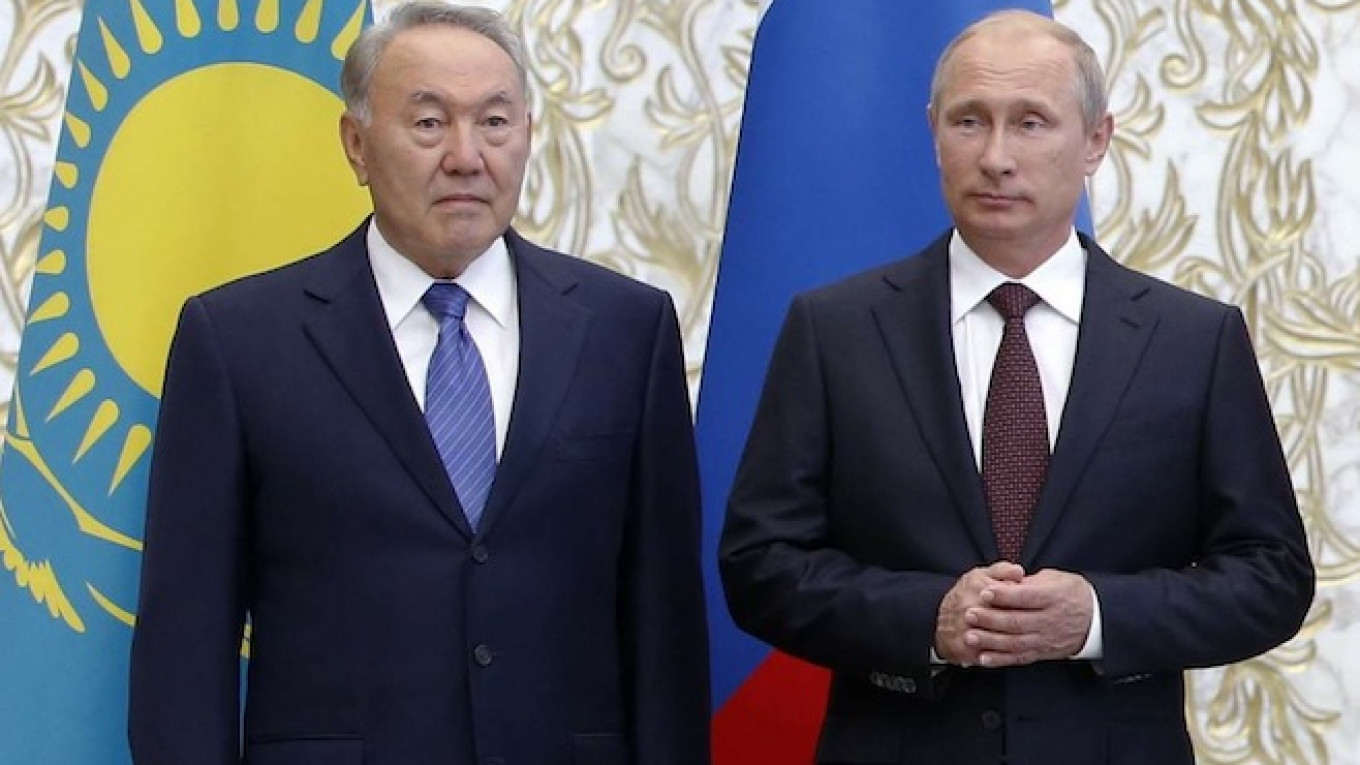President Vladimir Putin has said Kazakhstan's history of independent statehood is scant and its people's desire for closer ties with Russia is profound — a rhetoric reminiscent of Moscow's stance on Ukraine — and inhabitants of Kazakhstan are worried.
Kazakhs have taken to social networks to call for supporters to "send a history textbook to Putin" in response to the Russian leader's remarks last week that the Central Asian nation had never held any independence worth speaking of until very recently.
Kazakhstan's President Nursultan Nazarbayev has "created a state on a territory that never had a state," Putin told a pro-Kremlin youth camp at Lake Seliger near Moscow. "Kazakhs never had any statehood, he has created it."
One history chapter of which Kazakhs may like to remind Putin is the independent Kazakh Khanate state, which lasted from the 15th to the 19th century before it was weakened by invasions, taken over by the Russian Empire, and later became part of the Soviet Union.
Putin's remarks were hardly the first time Moscow has suggested that Kazakhstan might need a share of help from its former Soviet-era boss.
Russian nationalist leader Vladimir Zhirinovsky, who has stayed attuned to the Kremlin's views during his decades in parliament while adding a flamboyant spin to Putin's relative reserve, said last week that he would like to "sort things out with Ukraine" first, but that Kazakhstan also deserves a closer look.
"Russophobic moods are being cultivated there as well," Zhirinovsky said in an interview Wednesday with Ekho Moskvy radio.
Concern for the rights of Russian speakers was the reason that Moscow cited for annexing Crimea in spring, and for defending Ukraine's pro-Russian separatists who are fighting government troops in eastern Ukraine.
Zhirinovsky suggested that Kazakhstan may deserve a slightly different treatment because it is a member of Moscow-led Customs Union, a loose coalition of former Soviet states that also includes Belarus.
Kazakhstan's president was hardly reassured, warning that his country may withdraw from the union if the alliance threatened Kazakhstan's independence.
"Kazakhstan has a right to withdraw from the Eurasian Economic Union," Nazarbayev told his country's Khabar television, according to remarks cited by Kazakhstan's Tengri News on Wednesday. "Kazakhstan will not be part of organizations that pose a threat to our independence."
"Our independence is our dearest treasure, which our grandfathers fought for," Nazarbayev was quoted as saying. "First of all, we will never surrender it to someone, and secondly, we will do our best to protect it."
Putin's remarks over Kazakhstan's statehood recall a comment he reportedly made about Ukraine during a meeting with U.S. President George W. Bush in 2008.
"Ukraine is not even a state!" Putin was quoted by Russian media as telling Bush during the summit in Bucharest.
Putin's crediting of Kazakhstan's statehood to Nazarbayev has also prompted speculations on Russian social networks that the statehood may draw to an end in Moscow's eyes after the Kazakh president is replaced by a successor.
This would not be completely dissimilar to the way in which Russia has responded to events in Ukraine: After the Moscow-backed government of Ukrainian President Viktor Yanukovych was toppled by massive protests early this year, Russia denounced a successor administration as a result of a "fascist" coup and proceeded to annex Crimea and to back pro-Russian separatists in the east.
A participant at the pro-Kremlin youth camp at Lake Seliger also pointed out potential similarities, asking Putin whether the world should expect a "development of the Ukrainian scenario if Mr. Nazarbayev leaves office as president."
Putin responded that Nazarbayev "is alive and well, thank God, and has no plans to go anywhere yet." However, Putin said, an "overwhelming majority of Kazakhstan's citizens seek the development of relations with Russia, we see it and know it."
Political analyst Alexei Malashenko of the Moscow Carnegie Center wrote Sunday that the remarks could mean that a state that "has appeared thanks to one person, can also disappear thanks to one person."
But a simpler explanation — Putin expressing his "annoyance" at the reluctance of Russia's allies to cheer his policies in Ukraine — may be even more likely, Malashenko wrote in his blog on the Ekho Moskvy website.
Kazakhstan, which has a substantial ethnic Russian population in its northern regions, has seen its share of concerns about separatism and calls for secession to Russia.
When Nazarbayev moved his nation's capital from Almaty in the scenic southern mountains to Astana in the northern steppes in 1997, many attributed the move to his wish to strengthen the government's hold on the largely Russian-speaking north.
A Message from The Moscow Times:
Dear readers,
We are facing unprecedented challenges. Russia's Prosecutor General's Office has designated The Moscow Times as an "undesirable" organization, criminalizing our work and putting our staff at risk of prosecution. This follows our earlier unjust labeling as a "foreign agent."
These actions are direct attempts to silence independent journalism in Russia. The authorities claim our work "discredits the decisions of the Russian leadership." We see things differently: we strive to provide accurate, unbiased reporting on Russia.
We, the journalists of The Moscow Times, refuse to be silenced. But to continue our work, we need your help.
Your support, no matter how small, makes a world of difference. If you can, please support us monthly starting from just $2. It's quick to set up, and every contribution makes a significant impact.
By supporting The Moscow Times, you're defending open, independent journalism in the face of repression. Thank you for standing with us.
Remind me later.


